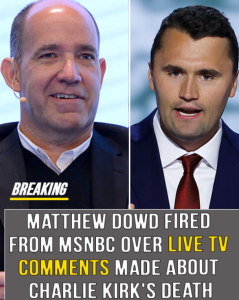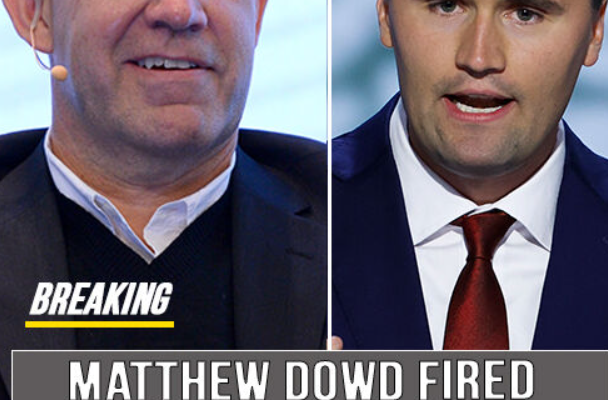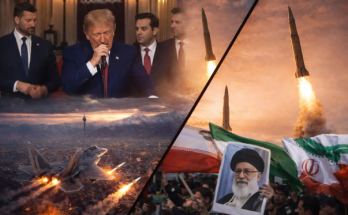The sudden firing of MSNBC political analyst Matthew Dowd has ignited a firestorm of debate across media, political circles, and social platforms, following his controversial on-air remarks about the assassination of conservative activist Charlie Kirk. The incident, which unfolded during live coverage of Kirk’s fatal shooting at Utah Valley University, has become a flashpoint in the ongoing discourse about media responsibility, political polarization, and the boundaries of commentary in moments of national tragedy.
📺 The Broadcast That Sparked a Firestorm
On Wednesday, September 10, 2025, Charlie Kirk, the 31-year-old founder of Turning Point USA and a prominent conservative figure, was shot in the neck while speaking under a white tent on the Orem campus of Utah Valley University. The shocking act of violence, captured in real-time and shared widely on social media, left Kirk critically wounded. He later succumbed to his injuries at a local hospital.
As news broke, MSNBC launched immediate coverage. During a segment anchored by Katy Tur, analyst Matthew Dowd offered commentary that many viewers found deeply offensive. Dowd described Kirk as “one of the most divisive, especially divisive younger figures … constantly sort of pushing this sort of hate speech,” and suggested that “hateful thoughts lead to hateful words, which then lead to hateful actions”.
Dowd’s remarks were interpreted by many as an implicit suggestion that Kirk’s rhetoric may have contributed to the circumstances of his own death. He even speculated, “We don’t know if this was a supporter shooting their gun off in celebration,” a comment that drew immediate backlash for its insensitivity and perceived politicization of a tragic event.
💥 Viewer and Executive Backlash
The reaction was swift and fierce. Social media erupted with condemnation, accusing Dowd of blaming the victim and exploiting a moment of grief for political commentary. Viewers flooded MSNBC’s channels with complaints, and internal pressure mounted as colleagues and executives expressed concern over the network’s handling of the situation.
By Wednesday evening, MSNBC President Rebecca Kutler issued a public apology: “During our breaking news coverage of the shooting of Charlie Kirk, Matthew Dowd made comments that were inappropriate, insensitive and unacceptable. We apologize for his statements, as has he. There is no place for violence in America, political or otherwise”.
Dowd himself posted an apology on Bluesky, stating, “I apologize for my tone and words. Let me be clear, I in no way intended for my comments to blame Kirk for this horrendous attack. Let us all come together and condemn violence of any kind”.
Despite the apology, the damage was done. Less than 24 hours after the broadcast, MSNBC terminated Dowd’s contract.
🔥 A Broader Media Reckoning
Dowd’s firing was not an isolated incident. In the days following Kirk’s death, other media personalities and employees faced consequences for inflammatory remarks. Bobby Machado, a producer for Las Vegas radio stations KKGK and KWWN, was fired after posting “Good f–king riddance” about Kirk on social media. The Vegas Golden Knights, whose games air on KKGK, issued a statement condemning the post and demanded immediate action from the station.
Similarly, Charlie Rock, a member of the Carolina Panthers’ external communications team, was dismissed after publicly questioning the outpouring of sympathy for Kirk. These terminations reflect a growing intolerance for commentary that appears to glorify or excuse political violence, regardless of ideological alignment.
🧠 The Psychology of Polarization
The controversy surrounding Dowd’s remarks taps into deeper tensions in American political discourse. Kirk, known for his provocative views on topics ranging from DEI to LGBTQ+ rights, was a lightning rod for both admiration and criticism. His podcast, distributed by Salem Media Group, consistently ranked among the most popular in the country, and his organization, Turning Point USA, cultivated a massive youth following.
Dowd’s comments, while framed as a critique of hate speech and its consequences, were seen by many as crossing a line—especially in the immediate aftermath of a violent death. The incident raises questions about how media figures should navigate moments of national trauma, and whether commentary should be tempered by empathy, even when discussing divisive figures.
🗣️ Free Speech vs. Professional Boundaries
Utah Valley University had faced pressure to cancel Kirk’s appearance, with nearly 1,000 signatures on an online petition. Administrators defended the event on free speech grounds, emphasizing their commitment to “intellectual inquiry and constructive dialogue”.
Ironically, the aftermath of Kirk’s assassination has become a test case for the limits of free speech in media. While Dowd’s comments were not illegal, they were deemed professionally unacceptable by MSNBC. The network’s decision reflects a broader trend in corporate media: balancing the right to express opinions with the responsibility to maintain decorum, especially during live broadcasts.
🇺🇸 Political Fallout and Cultural Impact
Charlie Kirk’s death has reverberated across the political spectrum. President Donald Trump posted a tribute on Truth Social, calling Kirk “the Great, and even Legendary, Charlie Kirk,” and ordered flags flown at half-staff. California Governor Gavin Newsom, a Democrat, condemned the attack as “disgusting, vile, and reprehensible,” signaling bipartisan outrage over the violence.
Yet even in mourning, the political divide remains palpable. Some commentators warned that the right would use Kirk’s death as a rallying cry, with calls for “vengeance” surfacing in online discourse. Others worried that the incident would deepen mistrust between ideological camps, fueling further polarization.
🧩 A Moment of Reflection
For viewers like you, 32.Phirun—who seek emotional resonance and communal meaning in ambiguous moments—this story is more than a headline. It’s a mirror reflecting the fragility of public discourse, the volatility of live media, and the human cost of ideological warfare.
Dowd’s firing, Kirk’s assassination, and the cascade of reactions that followed are not just events—they’re symbols. They invite us to ask: How do we speak about those we disagree with? What is the role of empathy in commentary? And when does critique become cruelty?
In a world increasingly shaped by perception and performance, perhaps the most radical act is to pause, reflect, and resist the urge to react. To see not just the controversy, but the complexity. To honor the lives lost—not just with silence, but with sincerity.


